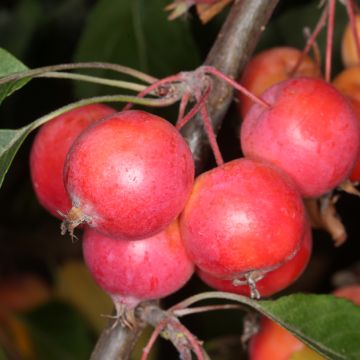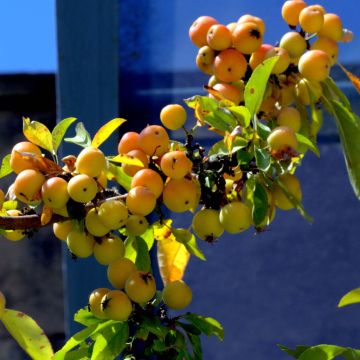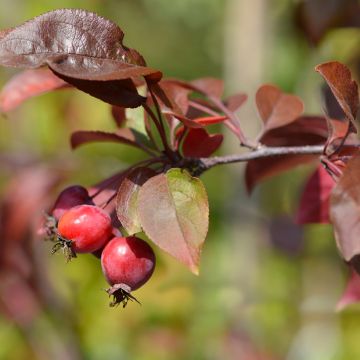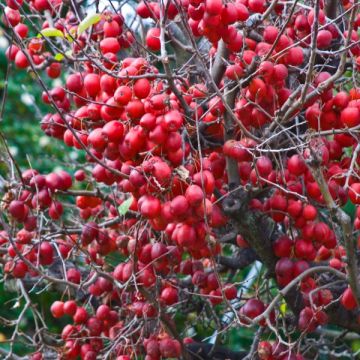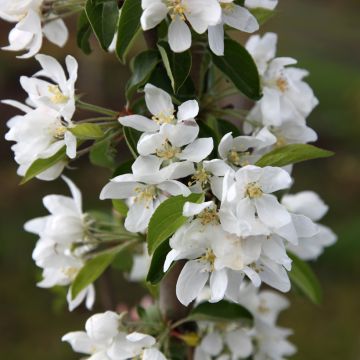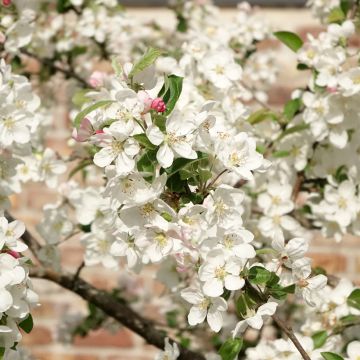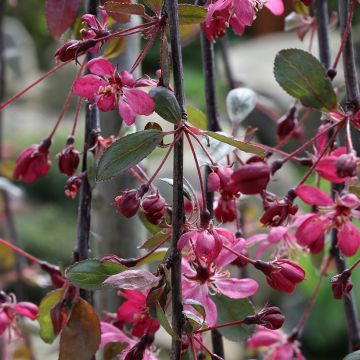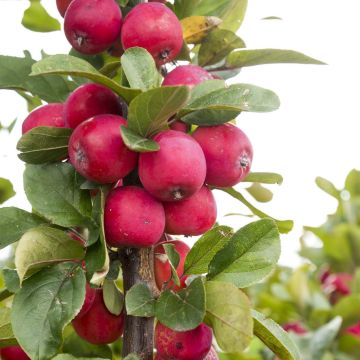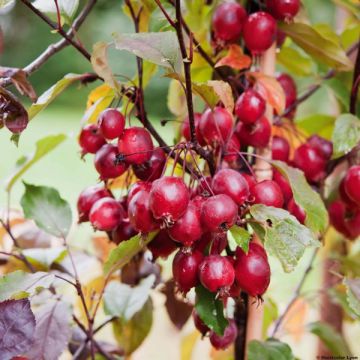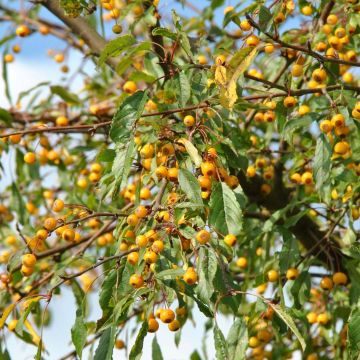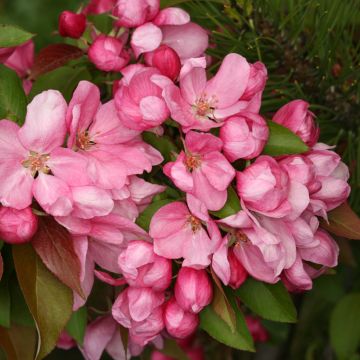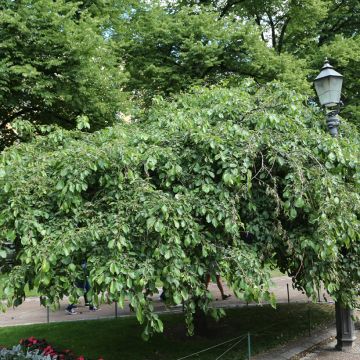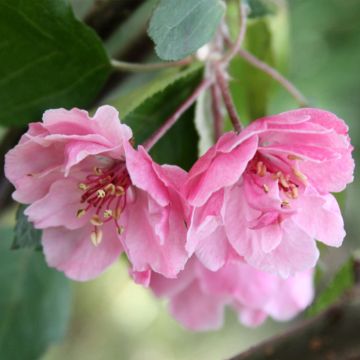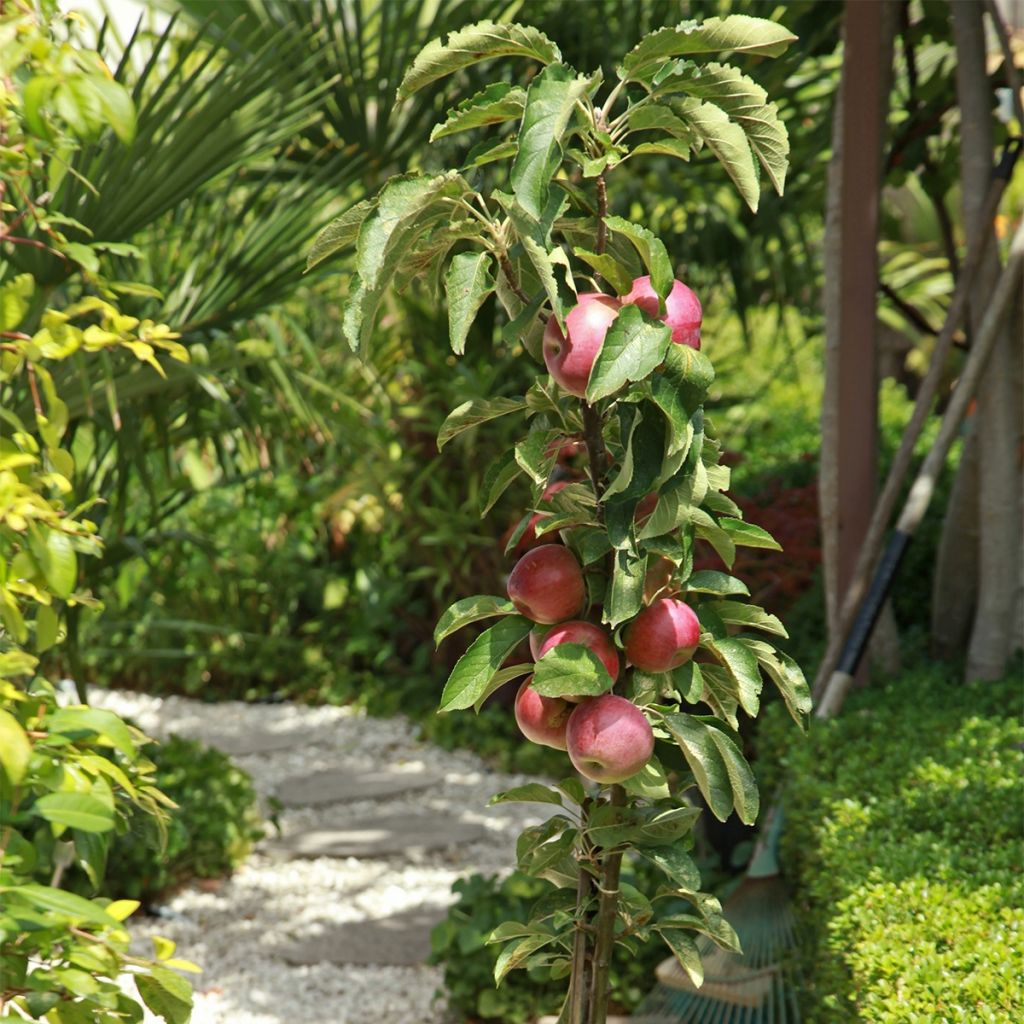

Malus Apollo - Crab Apple
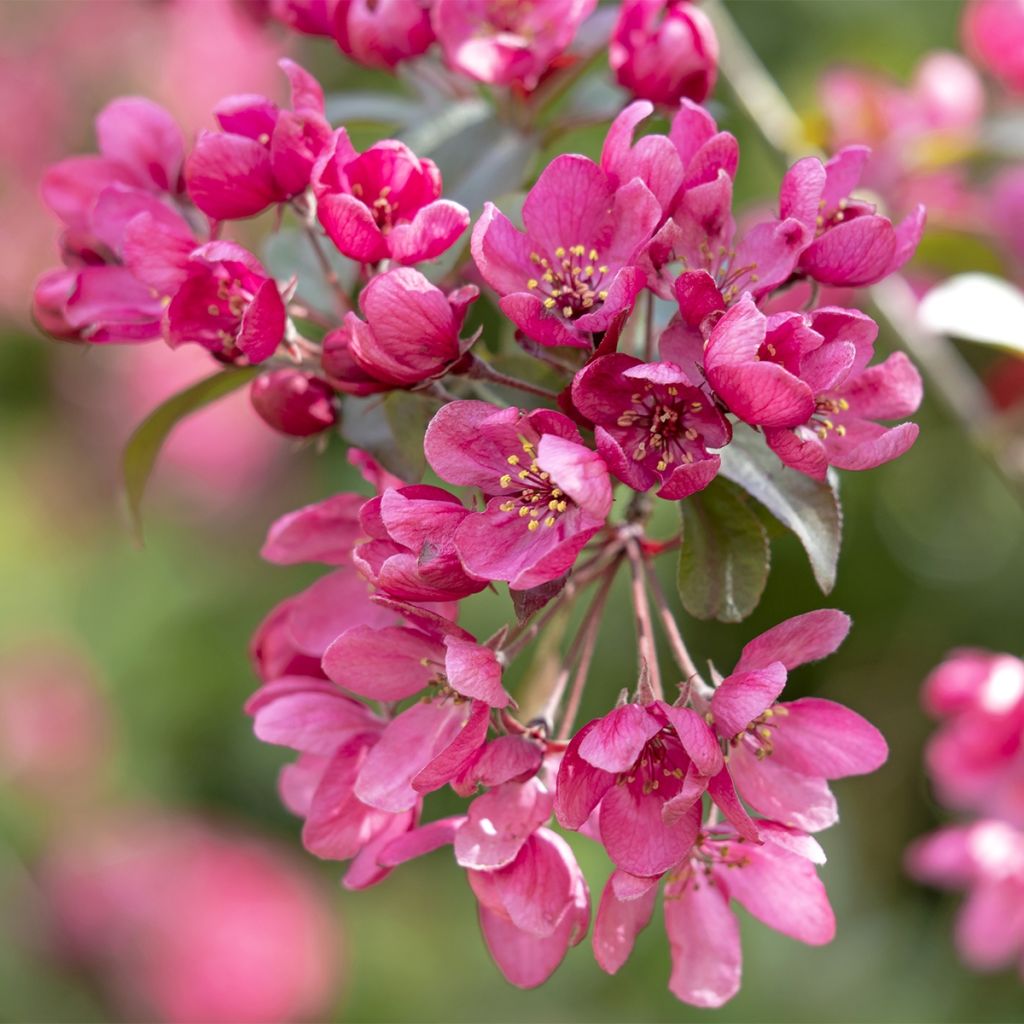

Malus Apollo - Crab Apple
Malus Apollo - Crab Apple
Malus Apollo®
Apple Tree, Crab Apple
Special offer!
Receive a €20 voucher for any order over €90 (excluding delivery costs, credit notes, and plastic-free options)!
1- Add your favorite plants to your cart.
2- Once you have reached €90, confirm your order (you can even choose the delivery date!).
3- As soon as your order is shipped, you will receive an email containing your voucher code, valid for 3 months (90 days).
Your voucher is unique and can only be used once, for any order with a minimum value of €20, excluding delivery costs.
Can be combined with other current offers, non-divisible and non-refundable.
Why not try an alternative variety in stock?
View all →This plant carries a 24 months recovery warranty
More information
We guarantee the quality of our plants for a full growing cycle, and will replace at our expense any plant that fails to recover under normal climatic and planting conditions.
Would this plant suit my garden?
Set up your Plantfit profile →
Description
With its very narrow columnar shape, Malus 'Apollo' is an ideal ornamental apple tree for small gardens. In spring, it is covered with beautiful single flowers in a dark pink colour that highlight its sculptural habit. In autumn, it bears a multitude of decorative fruits in a reddish-brown shade. Its compactness allows it to be placed in any small-sized garden. Adaptable to the soil, very hardy, easy to grow, resistant to diseases, it is a particularly desirable shrub or small tree.
Apple trees belong to the large Rosaceae family. It includes many wild species from the countryside (rowan, blackthorn, wild rose), as well as fruit trees (apple trees, pear trees, cherry trees, apricot trees), and small fruits (raspberries, strawberries, blackberries). It also incldues ornamental gems, such as rose, queen of flowers, cotoneasters, pyracanthas, amelanchiers, and ornamental apple trees.
'Apollo' is a valuable variety for small spaces, due to its compact size. This apple tree forms a perfect column, which is particularly narrow. At maturity, its height can reach 4m (13ft), but its width will not exceed 60 to 80cm (24 to 31 in)! Its unique habit allows it to be planted in any plot, no matter how small. In spring, its young leaves appear tinged with purple before turning to a medium green. In April-May, it transforms into a flowering torch, covered with pretty single flowers with 5 petals, in a beautiful dark pink colour tending towards red. Appealing like sweet candies, these flowers are not fragrant, but will nonetheless delight bees. In autumn, a multitude of decorative fruits appear, in a slightly dark red colour, with shades of brown.
This beautiful flowering apple tree grows in all types of soils, preferably clayey and well-drained, and appreciates some moisture to grow well. A sunny exposure will promote its flowering. It does not require pruning, but its size can be further refined at the end of winter or after flowering.
'Apollo' is as surprising as it is decorative with its thread-like habit. To play with shapes as well as colours, plant Japanese Quince 'Hot Fire' alongside it, with its spreading habit, which can be pruned into a low cushion. Its stunning bright red flowering will precede 'Apollo's', while its fairly large green-yellow fruits will also be decorative. And to blur the boundaries, mix genres by associating it with dwarf fruit varieties. Fall for the Dwarf Pear Tree 'Garden Gem' with reddish fruits as big as "normal" pears, while this miniature tree can be kept at 1.5m (5ft) tall. The Dwarf Cherry Tree 'Garden Bing' will delight you with its bright red cherries in June, while the Dwarf Nectarine Tree 'Snow Baby' will enchant your taste buds in August!
Report an error about the product description
Malus Apollo - Crab Apple in pictures
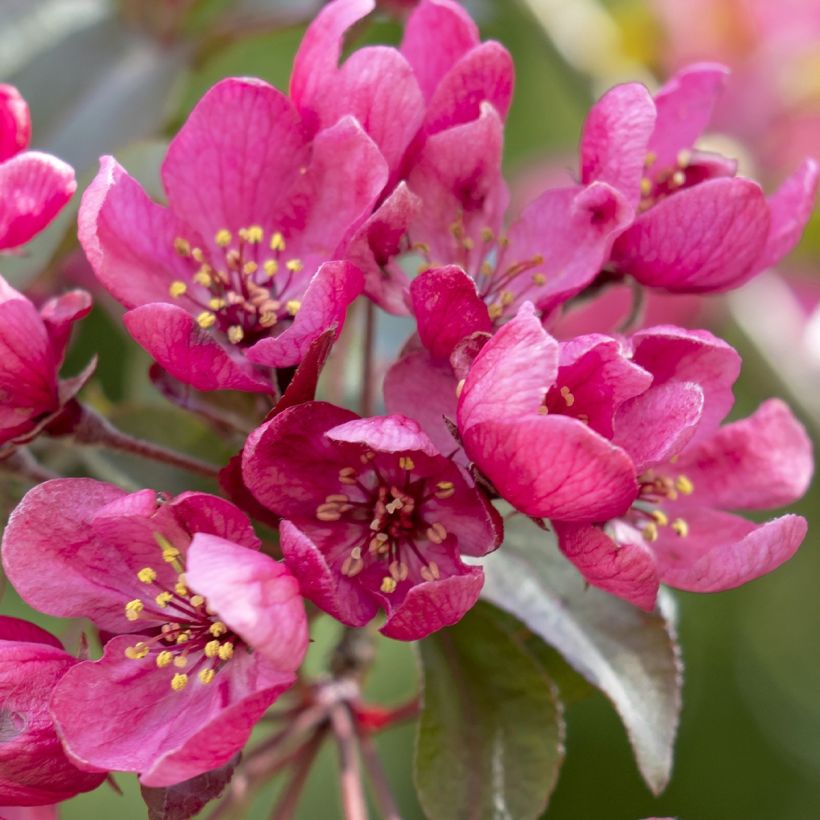

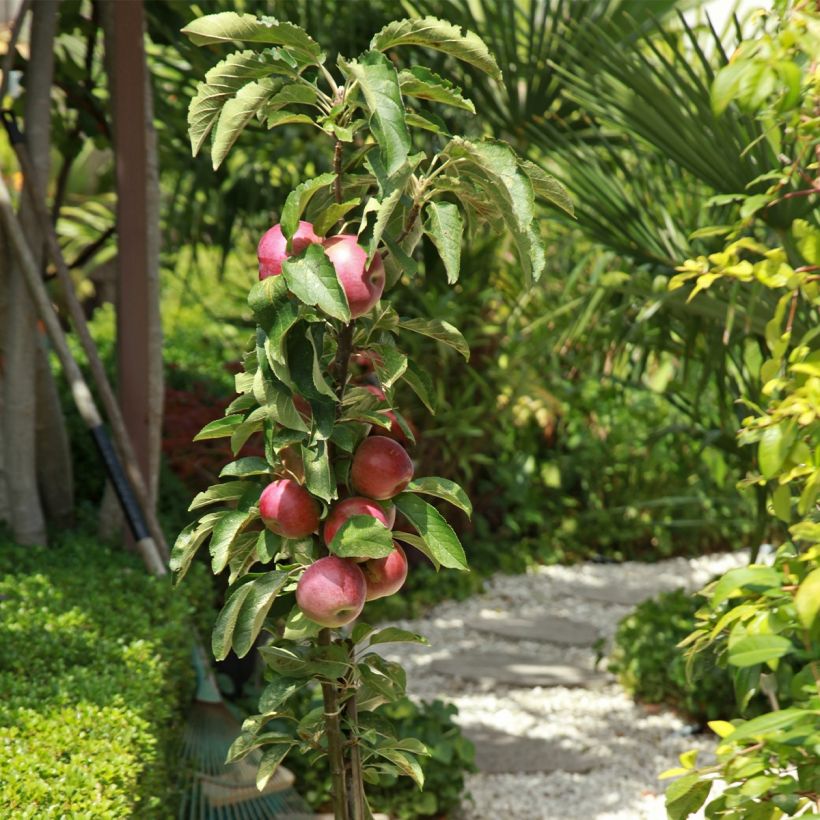

Plant habit
Flowering
Foliage
Botanical data
Malus
Apollo®
Rosaceae
Apple Tree, Crab Apple
Cultivar or hybrid
Other Malus - Crabapple
View all →Planting and care
Ornamental Malus trees are generally very accommodating. Easy to grow in ordinary, fairly rich, deep, moist but well-drained soil, Malus 'Apollo' requires a bright exposure to bloom well. Dig a large planting hole. If the soil is poor, add compost to the planting soil and apply fertiliser or compost to its base every spring. After careful planting and regular watering during the first two years, they manage on their own. Prune lightly after flowering to eventually regularise the shape, avoiding cutting thick branches.
Planting period
Intended location
Care
This item has not been reviewed yet - be the first to leave a review about it.
Haven't found what you were looking for?
Hardiness is the lowest winter temperature a plant can endure without suffering serious damage or even dying. However, hardiness is affected by location (a sheltered area, such as a patio), protection (winter cover) and soil type (hardiness is improved by well-drained soil).

Photo Sharing Terms & Conditions
In order to encourage gardeners to interact and share their experiences, Promesse de fleurs offers various media enabling content to be uploaded onto its Site - in particular via the ‘Photo sharing’ module.
The User agrees to refrain from:
- Posting any content that is illegal, prejudicial, insulting, racist, inciteful to hatred, revisionist, contrary to public decency, that infringes on privacy or on the privacy rights of third parties, in particular the publicity rights of persons and goods, intellectual property rights, or the right to privacy.
- Submitting content on behalf of a third party;
- Impersonate the identity of a third party and/or publish any personal information about a third party;
In general, the User undertakes to refrain from any unethical behaviour.
All Content (in particular text, comments, files, images, photos, videos, creative works, etc.), which may be subject to property or intellectual property rights, image or other private rights, shall remain the property of the User, subject to the limited rights granted by the terms of the licence granted by Promesse de fleurs as stated below. Users are at liberty to publish or not to publish such Content on the Site, notably via the ‘Photo Sharing’ facility, and accept that this Content shall be made public and freely accessible, notably on the Internet.
Users further acknowledge, undertake to have ,and guarantee that they hold all necessary rights and permissions to publish such material on the Site, in particular with regard to the legislation in force pertaining to any privacy, property, intellectual property, image, or contractual rights, or rights of any other nature. By publishing such Content on the Site, Users acknowledge accepting full liability as publishers of the Content within the meaning of the law, and grant Promesse de fleurs, free of charge, an inclusive, worldwide licence for the said Content for the entire duration of its publication, including all reproduction, representation, up/downloading, displaying, performing, transmission, and storage rights.
Users also grant permission for their name to be linked to the Content and accept that this link may not always be made available.
By engaging in posting material, Users consent to their Content becoming automatically accessible on the Internet, in particular on other sites and/or blogs and/or web pages of the Promesse de fleurs site, including in particular social pages and the Promesse de fleurs catalogue.
Users may secure the removal of entrusted content free of charge by issuing a simple request via our contact form.
The flowering period indicated on our website applies to countries and regions located in USDA zone 8 (France, the United Kingdom, Ireland, the Netherlands, etc.)
It will vary according to where you live:
- In zones 9 to 10 (Italy, Spain, Greece, etc.), flowering will occur about 2 to 4 weeks earlier.
- In zones 6 to 7 (Germany, Poland, Slovenia, and lower mountainous regions), flowering will be delayed by 2 to 3 weeks.
- In zone 5 (Central Europe, Scandinavia), blooming will be delayed by 3 to 5 weeks.
In temperate climates, pruning of spring-flowering shrubs (forsythia, spireas, etc.) should be done just after flowering.
Pruning of summer-flowering shrubs (Indian Lilac, Perovskia, etc.) can be done in winter or spring.
In cold regions as well as with frost-sensitive plants, avoid pruning too early when severe frosts may still occur.
The planting period indicated on our website applies to countries and regions located in USDA zone 8 (France, United Kingdom, Ireland, Netherlands).
It will vary according to where you live:
- In Mediterranean zones (Marseille, Madrid, Milan, etc.), autumn and winter are the best planting periods.
- In continental zones (Strasbourg, Munich, Vienna, etc.), delay planting by 2 to 3 weeks in spring and bring it forward by 2 to 4 weeks in autumn.
- In mountainous regions (the Alps, Pyrenees, Carpathians, etc.), it is best to plant in late spring (May-June) or late summer (August-September).
The harvesting period indicated on our website applies to countries and regions in USDA zone 8 (France, England, Ireland, the Netherlands).
In colder areas (Scandinavia, Poland, Austria...) fruit and vegetable harvests are likely to be delayed by 3-4 weeks.
In warmer areas (Italy, Spain, Greece, etc.), harvesting will probably take place earlier, depending on weather conditions.
The sowing periods indicated on our website apply to countries and regions within USDA Zone 8 (France, UK, Ireland, Netherlands).
In colder areas (Scandinavia, Poland, Austria...), delay any outdoor sowing by 3-4 weeks, or sow under glass.
In warmer climes (Italy, Spain, Greece, etc.), bring outdoor sowing forward by a few weeks.






























